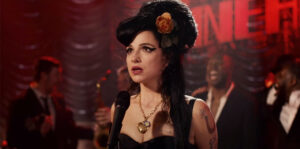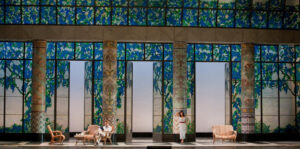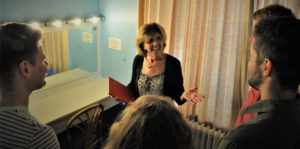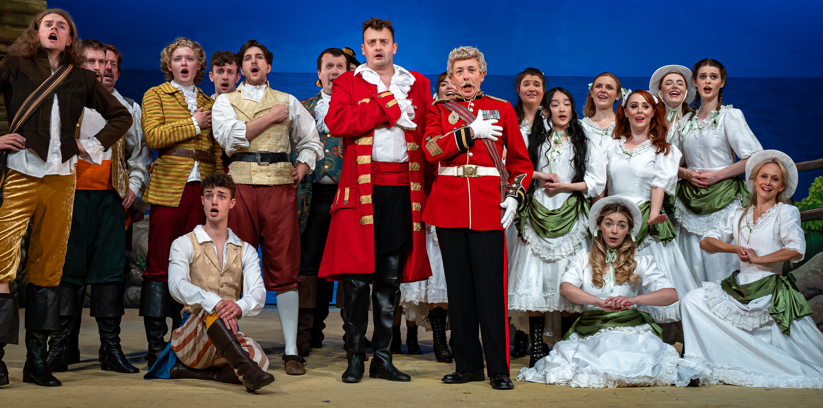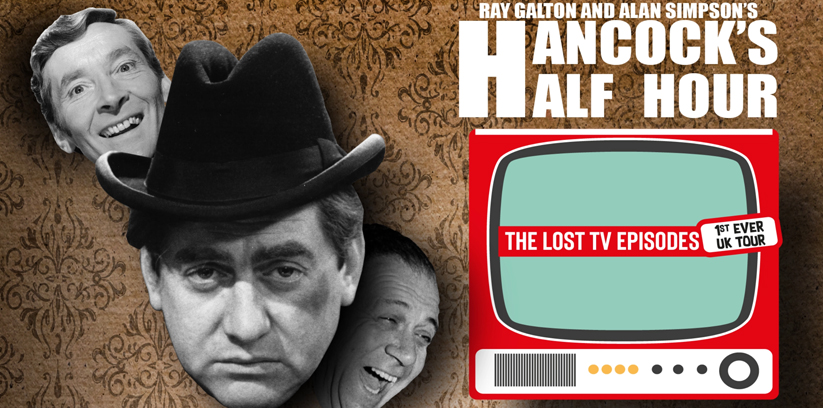
Coming Soon
Theatre Tours
April 21st 12:00 pm
One event on 21st April 2024 at 12:00pm
One event on 19th May 2024 at 12:00pm
One event on 2nd June 2024 at 12:00pm
One event on 7th July 2024 at 12:00pm
One event on 11th August 2024 at 12:00pm
One event on 1st September 2024 at 12:00pm
One event on 16th June 2024 at 12:00pm
Event Calendar
| M | T | W | T | F | S | S |
|---|---|---|---|---|---|---|
The School for Scandal
Back to Black (15)
Phoenix Dance: BELONGING: Loss. Legacy. Love.
The Shamrock Spitfire (12A) + The Elvermen
MET: La Rondine
Event Search
- This event has passed.
Mrs Warren’s Profession
11th April 2023 - 15th April 2023
Event Navigation
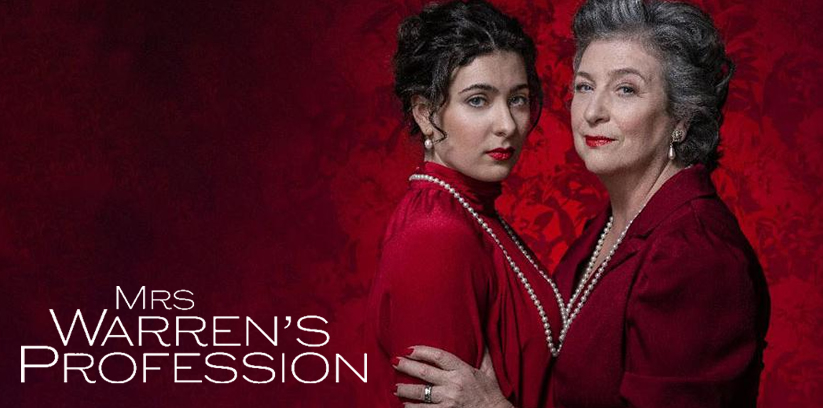
Theatre Royal Bath Productions
presents
CAROLINE QUENTIN
SIMON SHEPHERD, MATTHEW COTTLE, STEPHEN RAHMAN-HUGHES
ROSE QUENTIN, PETER LOSASSO
MRS WARREN’S PROFESSION
by George Bernard Shaw
Directed by Anthony Banks
What is Mrs Warren’s profession?
Mrs Warren’s daughter Vivie has never really known much about her mother. Vivie has a Cambridge education, a generous monthly allowance and now she has ambitions to go into the Law. But could it all have been financed from the profits of the world’s oldest profession? How will Vivie react when she finds out the startling truth about her mother’s business empire?
Shaw’s acid test of a mother-daughter relationship is one of his wittiest and most provocative plays. Written in 1894 but banned for thirty years by a Lord Chamberlain who found it “immoral and improper”, Mrs Warren’s Profession is a ripe attack on English hypocrisy and its “fashionable morality”.
British Comedy Award winner, Caroline Quentin’s many television roles have ranged from Men Behaving Badly, Kiss Me Kate and Jonathan Creek to Stephen Poliakof’s Dancing on the Edge, and Strictly Come Dancing, and she recently starred onstage in the National Theatre’s Jack Absolute Flies Again.
Simon Shepherd‘s many credits include ITV’s Peak Practice and the West End productions of Posh, The Duck House, Rapture, Art and Hay Fever. Matthew Cottle has been a regular in many popular TV series including Game On, The Windsors and featured in Unforgotten, Bridgerton and Pistol.
Vivie is played by Caroline’s real-life daughter, Rose Quentin who recently created the role of Katrina Van Tassel on tour in the stage version of The Legend of Sleepy Hollow.
Anthony Banks was Associate Director at the National Theatre from 2004 to 2014. His many directing credits include The Girl on the Train, Twilight Song, Gaslight, Strangers on a Train, After Miss Julie and My Cousin Rachel.
“Caroline Quentin is a joy” Mail on Sunday
“One of our greatest comic actresses” Independent
Running time: 2 hours 10 minutes (including interval)
Photo credit: Pamela Raith
Related Events
Event Reviews
-
Showtime! John Phillpott
At the time this play was written it’s said that the number of sex workers in London ran into six figures.
As a journalist working in the capital city of the greatest empire the world had ever known, George Bernard Shaw must have witnessed at first hand the desperate conditions in Victorian Britain that led women to sell their bodies.
A mere five years before Shaw completed his play, the Jack the Ripper murders had not only shocked but also terrorised a vulnerable section of the population. This then is the backdrop to Shaw’s masterpiece, a visible, everyday reality that he neither condemns nor condones.
Real-life mother and daughter Caroline Quentin and Rose Quentin play the respective roles of Kitty and Vivie Warren. To say this is one of the best double acts that this reviewer has ever witnessed gets nowhere near.
As the daughter’s curiosity regarding the source of her mother’s financial wealth builds, bubbles and finally bursts like lava spewing forth from the lip of a volcano, the Malvern Festival Theatre stage becomes electric.
The audience is transfixed by the sheer, unrelenting and unforgiving intensity of the exchanges. It is drama that gives no quarter, neither asks for any.
Mrs Warren has woven a tangled web from which none of the protagonists can hope to evade. All their lives are coloured by the life of this one individual, who although initially comes over as a refined lady, soon reverts to her natural state, that of a sort of red-light district Eliza Doolittle with the vowels to match.
Nothing is as it appears. Yet scratch the thin surface of respectability and there are issues that ultimately cannot be ignored, not least those of paternity, maternity and perhaps even incest.
Praed (Stephen Rahman-Hughes) may be a hopelessly naïve innocent abroad, but what about loved-up Frank Gardner (Peter Losasso)? Will he, or rather can he, wed the vivacious Vivie, or might there be a genetic impediment?
Meanwhile, the oily Sir George Crofts (Simon Shepherd) is the very antithesis of the Victorian gentleman. He is the scheming counterpoint to the bumbling Canon Chasuble-esque figure of the Reverend Sam Gardner (Matthew Cottle), who may well be concealing a dark secret beneath that frock-coated priestly holiness.
Mrs Warren’s Profession has lost none of its power over the last 130 years. And although its creator skilfully avoided falling into the trap of moral judgement, his message of injustice being the handmaiden to hypocrisy goes to form a parable that transcends time and distance.
A powerful play with a timeless message.
-
The View From The Stalls
A wonderful cast in a show with relevance today.
It is certainly not unheard of for mother and daughter to be in the same production though often using different surnames (think Vanessa Redgrave and daughter Natasha Richardson, Judy Garland and Liza Minnelli, Tippi Hedren and Melanie Griffith) - however, in this production of George Bernard Shaw's Mrs Warren's Profession, we have two Quentins, mother Caroline and daughter Rose playing mother Kitty Warren and daughter Vivie. Two members of a very strong cast of six which also features Simon Shepherd, Matthew Cottle Stephen Rahman-Hughes and Peter Losasso. The show also features an amazing set design with no less than 3 different locations - a quant country house and garden in Surrey complete with a thatched roof, the village's centuries-old church and a London office. The house in particular is impressive, looking more like a Wendy house until 4 of the cast actually do end up inside it!
Written in 1893 (and unsurprisingly immediately banned by the Lord Chamberlain for three decades for being “immoral and improper”), Shaw's play resonates even today. The "profession" in question (never actually stated but clearly the "oldest" one), comes about according to Shaw because of economic necessity whilst the play also touches on the possibility of incest as, after all, who is the real father of not just her daughter but also the vicar's son Frank? As a "madame" of a number of "hotels" across the continent, Kitty has proven a strong and financially successful partner in this lucrative business whilst keeping its activities largely hidden away for obvious reasons, especially from her daughter who she shipped off to boarding school and Cambridge with a monthly allowance, rarely seeing her. As a result, the daughter wants nothing to do with the life her mother has been leading which results in fractious conversations between the two. And it is the moments when the mother lets her gloss slip somewhat and speaking her true mind in her real accent that are often the most humorous.
There is a palpable contrast between the location in Haslemere - quaint country cottage on a summer's day with its equally quaint old church - and the backgrounds of the people who are meeting there, all somehow linked to the nefarious activities of Kitty. There must have been some interesting conversations between the real mother and daughter (the latter taking up the profession of the former in real life) and the characters they play, where the daughter totally distances herself initially from the mother's activities and ultimately from the mother herself. The interplay between them on stage is wonderful to see, as it is between the other actors too. With both Shepherd's character Sir George Crofts and Lossaso's lowly labourer Frank vying for her attention and love, Vivie shows herself not be a woman to be dallied with which, if nothing else, is a trait picked up from her mother.
A 100+ years old feminist drama written by a man with a stellar cast portraying "English hypocrisy and its “fashionable morality” which nowadays would be simply "woke" - that is definitely something worth seeing!
-
Weekend Notes - Alison Brinkworth
George Bernard Shaw had a knack for writing about women from the underbelly of society, humanising them for their aspirations and highlighting 'fashionable morality' that could set them back. Pygmalion may be the most famous of his plays but Mrs Warren's Profession is just as astute focusing on the world's oldest profession.
As a troubled mother-daughter relationship is at the heart of this story, it's interesting that Caroline Quentin is starring opposite her real-life daughter Rose Quentin as the entrepreneurial Mrs Warren and spirited young Vivie.
There are marvellous sets from a charming country cottage that the cast manages to humorously all squeeze inside to a huge church as a backdrop. The finale in an art deco law office is breathtaking too and all adds to the sumptuous feel of this classy show.
It's set around young headstrong and intelligent Vivie Warren, who is fresh from a degree at Cambridge University and preparing for a visit from her estranged mother. She wants to go into a career in law but others are intent to get her married off.
What Vivie hasn't realised until now is that her mother's career in prostitution has funded her education and lifestyle, but that is about to change with the arrival of brash Mrs Warren and her unsavoury investor Sir George Crofts.
British Comedy Award winner Caroline Quentin - a fine actress who is somewhat under-rated as one of the strongest theatre performers of a generation - is well cast as an emphatic Mrs Warren. From the moment she arrives, Quentin commands all the attention.
With her best shrill voice, Quentin focuses on every little detail to shows the raw ambition and bluntness of a woman who was cunning enough to escape the poverty forced upon her.
This George Bernard Shaw classic may have originated in Victorian times but its wit and hypocrisy still rings true down the ages. Written in 1894, it was banned for thirty years by Lord Chamberlain who found it “immoral and improper”. Even now, the attitudes towards women sadly haven't changed that much so it still feels relevant to some degree.
There's also the age-old family issue of children not doing what their parents have planned. Rose Quentin holds her own as an emerging talent in her own right as Vivie, and the arguments and tenderness that play out feel realistic, maybe helped by the closeness of the Quentins' relationship in real life.
There's strong support from well-known and experienced faces in this production. Simon Shepherd, of Casualty, Peak Practice and many other TV shows, has a delicious dastardly edge to Sir George. Matthew Cottle, who many will remember from BBC show Game On, has perfect comic timing as Reverend Sam Gardner whose murky past with Mrs Warren catches up with him.
Peter Losasso as his caddish son Frank, who is woo-ing Vivie, is a delight with a sprightly performance that adds zest to the production. His chirpy joshing with his father is the comedy highlight of the show, helped by Losasso and Cottle's wonderful camaraderie on stage.
Finally, there's Stephen Rahman-Hughes, of Emmerdale and EastEnders - a straight bat among the cavalcade of eccentric characters as Praed.
Director Anthony Banks was behind the recent atmospheric UK tour of The Girl On The Train, in which he inspired a memorable performance from Samantha Womack. He once again does well with a drama that puts women at the centre of the action and has chosen his cast well.
There's much to like in this slick, well-acted and intriguing new version of Mrs Warren's Profession. While the topic may not be as controversial as it once was, it's stood the test of time due to the playwright's compassionate script.
-
British Theatre Guide - Colin Davison
Only a dogged contrarian like GBS could write a play in late Victorian times that advanced a plausible case for prostitution.
Mrs Kitty Warren took up the ‘profession’ to escape a life of poverty, from the prospect of working in the lead factory that killed her sister or scrubbing floors for 1/6d a day, and to provide a better life for her daughter Vivie.
Vivie has grown up in the care of others. Now a first-class Mathematics graduate from Cambridge, she returns and learns for the first time the source of her mother’s wealth that has funded her education.
The liberal-minded young woman is ready to forgive, but the moral tipping-point of the play is the revelation that mama, having earned enough for them both to live comfortably, has expanded the business, running a series of brothels from Ostend to Budapest, just the sorts of establishments frequented by the then Prince of Wales, the future Edward VII.
It was no surprise that in 1898, the play, drawing uneasy parallels between prostitution and the restrictions of marriage, was banned by the Lord Chamberlain.
Shaw encapsulates the case for and against the oldest profession in the person of Mrs Warren, brilliantly brought to life by Caroline Quentin. She is all determination, fire-breathing self-will in recounting her early career, all blind hypocrisy as she vows not getting her hands dirty in the trade.
Quentin commands the stage, and lightens the darkness with her huge talent for comedy, not something based on superficial mannerisms but drawing upon deep appreciation of character. I cannot imagine a better interpretation of the role.
Director Anthony Banks sets the play in the 1920s, which well suits the role of Vivie as an independent-minded, post-war, cigar-smoking, whisky-drinking free-thinker, rejecting any idea of marriage in favour of a successful business career.
Caroline’s real-life daughter Rose Quentin plays Vivie, with a handshake as firm as her intentions. She brings a steely concentration to this less nuanced role, but Shaw’s wordiness seems at times rather to push the speed of her delivery, and a moment of revelation, that she and Peter Losasso’s Frank might be half-brother and sister, falls flat.
The real villain of the piece is Sir George Crofts, played with chilly amoral arrogance by Simon Shepherd, an aristocrat who cannot claim poverty as an excuse, Mr 35%, a man who a century before would have made his money in the slave trade.
Matthew Cottle, the priest with a past, and Stephen Rahman-Hughes, the naïve admirer, fit very well the supporting roles that add colour to the main characters.
David Woodhead’s beautiful sets under Lizzie Powell’s lighting recreate a bucolic Surrey, with a reduced-size thatched cottage and C13 Church, and a final scene in Vivie’s Chancery Lane office. That one is full-size, as if hard business reality has replaced the fantasy values that went before.
-
Behind the Arras - Roger Clarke
Mrs Warren is very much part of the establishment these days, a bit rough and ready, a bit faded around the edges, more glory days behind than ahead of her, but she is enjoying her moment in the sun as managing director of an international hotel chain.
It is a chain which offers, should we say, a more discrete menu of room services of a rather personal nature for the more discerning guest and we first come across her as she arrives to meet her daughter Vivie at a cottage she is staying in Haslemere in the Surrey countryside, south west of London.
Vivie, just graduated in maths from Cambridge, has hardly ever seen her mother and has no idea about what she does or her . . . rather horizontal rise through the ranks to her current managerial position, so it is rather a meeting of strangers as the pair become acquainted.
We have Mrs Kitty Warren, the Mrs added for respectability with no Mr to be found, wanting a mother-daughter relationship, something she sees as her maternal right – especially with old age creeping up. Then there is a daughter with a mother who has been little more than a generous monthly allowance and settled bills. Her mother is a woman she is related to but with little to relate to.
It is a wonderful performance from Caroline Quentin as Kitty and her real-life daughter Rose Quentin. Performances full of asides, glances and looks, and brilliant timing.
The pair have the two main and telling scenes, scenes which end both Act 1 and then the play. In the first Mrs Warren tells of the grinding poverty in her childhood, her mother selling rather more than fish to put food on the table, a sister poisoned working in a white lead factory, her slave labour jobs, long hours and low pay and then her long lost sister Lizzie returning . . . well dressed, wealthy, well connected and . . . well paid for the services she offers. and she offers a partnership in the business Kitty now owns – all so her daughter would not face the same harsh choices she had faced.
Vivie sees that as noble, her mother a champion but that changes in the final act when she comes to despise her mother, not for her choices to rise above crippling poverty, but for what she has become, what she is now.
The daughter has been forced to be strong and independent to survive, and she shows it . . . at least in public. The two duologues being the crux of the play.
Then there is the side show of other characters. There is Stephen Rahman-Hughes as Praed, a middle-aged architect, a friend of Mrs Warren, and crucially not a client. He is a cultured, intellectual. Vivie is now an available young lady in Kitty’s eyes, and you suspect she sees the harmless, well-heeled, respectable, professional Praed as a possibility for a successful marriage - i.e. financially secure and socially acceptable.
Then there is Simon Shepherd as Sir George Crofts, Kitty’s business partner, who despite a 25 year age difference, and an obvious relationship with her mother, sees himself as an ideal husband for Vivie, his only attributes being wealth, from the chain of hotels, or to be more accurate, brothels, and the promise that he would leave her rich when he died which would be long before her.
His smarmy attempt to woo her, almost a business transaction rather than romance, encompassed threats with a hint of blackmail.
Vivie’s real suitor was Frank Gardner, played by Peter Losasso, who adored her with a love as deep as . . . well her bank balance. Frank had no qualifications, no job, no inclination to get one and a future that involved marrying into wealth, with Vivie the current target. A mercenary shallowness we were to discover later.
Finally, there is country rector the Rev Sam Gardner, played by Matthew Cottle, completely broke after financially bailing out son Frank, who comes face to face, unexpectedly with Kitty, stirring memories of a time when he had found love . . . for sale, and bought it.
So, we have an intellectual dreamer, a licentious up-market pimp, a man of God with a past more phew than pew, a wastrel looking for a meal ticket in the guise of a wife, a jolly and rich madame, and a daughter who has been left to her own devices so long she has made independence an art form.
The result is a witty comedy from George Bernard Shaw with some delightful lines, but there are some telling and uncomfortable moments when morality is questioned. It was a morality that saw the play banned by the Lord Chamberlain from public performance for some 32 years.
Written in 1893 the play was first performed in 1902 in a private performance and it could only be shown in members only theatres and clubs until 1925, presumably to protect the lower classes from moral turpitude.
Much the same protect the peasantry reasoning used behind allowing Lady Chatterley’s Lover to be published in hardback but banned in paperback.
It seems ludicrous in an era when plays such as Rattle of a Simple Man or The Blue Room hardly raise an eyebrow, but it was not just the subject matter, a play involving, even obliquely, brothels and prostitution, it was also Shaw’s defence of prostitution in the play and his reasoning that poverty was the driving force, not lack of morality nor female depravity. Kitty was not debauched; she was struggling to keep body and soul together and without turning to sex work she would have ended up an old woman at 40 if she wasn’t dead by then.
Prostitution was not a choice or ambition, it was her means of escape. Prostitution was a social problem, a claim challenging Victorian morality – the uncomfortable idea that we all might be responsible.
Shaw went even further in the play pointing out that there was a certain hypocrisy in demonising a woman selling sex for money while encouraging young ladies to go and find husbands based on wealth and social standing, the higher in both the better.
It is a claim which still has merit. Cuts in benefits, widespread job losses, high inflation or cost of living all see a rise in sex workers, as is being seen now – Shaw was merely dramatizing the documented evidence.
Meanwhile, back in Haslemere, David Woodhead has produced a fascinating set with a tiny cottage, almost a large dolls house, complete with thatched roof and smoking chimney and a second set, after the interval, of a tiny church set at a strange perspective angle. They are almost cartoon like as if what is happening is not quite real.
All that changes with the only visible scene change as the stage is cleared and a Victorian London office is revealed at the rear of the stage, smoothly sliding forward. No hint or cartoon or jokes here, this is very real and we know that what is about to happen matters.
The lighting from Lizzie Powell is equally impressive. It is so good that it probably goes unnoticed. In the initial garden scene, it looks like sunlight, as night falls the lanterns in the tree light and the lighting slowly changes to moonlight with the sky gradually darkening and the stars starting to shine. Imperceptible changes that help to set time and scene in equal measure.
This is a play with fine performances by the entire cast, plenty of laughs, but with a hard centre and 130 years on still has moments that resonate.
-
West End Best Friend - Rachel Louise Martin
Written by George Bernard Shaw in 1894, Mrs Warren’s Profession was banned for thirty years as its content thought to be “immoral and improper”. However, that same content feels more relevant today and begs the question “have societies attitudes really changed that much in the last hundred years?”
Mrs Warren’s daughter, Vivie, doesn’t really know that much about her mother, having been brought up by a nanny, then sent to boarding school and then Cambridge. She has a generous monthly allowance and ambitions on a career in Law, but where exactly did her mother’s self-made fortune actually come from? What is Mrs Warren’s profession? How will Vivie react when she discovers the truth about her mother’s business empire?
Kitty and Vivie Warren are played by real life mother and daughter, Caroline and Rose Quentin. Kitty has her public persona and then relents to her true roots whilst telling her daughter the truth about her ‘business’. Vivie is the confident, carefree young woman, the world of opportunity ahead of her and an ambition to match.
Their relationship is evident as you would expect, but their strength apparent as they show they are both as stubborn as each other, reflecting the affectionate traits that their characters share, particularly in their shared scenes and both are a delight to watch.
Matthew Cottle as Reverend Sam Gardner is the element of comic relief in what is a typically wordy Shaw script. His horror that Mrs Warren may spill some secrets of his misspent youth and the realisation that no one knows who Vivie’s father is, a witty sub context to his dilemma.
Shaw’s metaphor of prostitution is an important nod to the corruption of society that is relatable even though we are in 1920’s Surrey.
The set design is extraordinary. David Woodhead has created the most delightful little cottage, with emphasis on the little (it’s quite amusing to see four adults struggling to fit inside what is initially a wooden Wendy house), an idyllic country church and a smart London office.
It’s a pleasant evening of satirical charade’s that has worn well in the hundred years since it was written.
A droll example of societies flaws.
-
Fairy Powered Productions - Courie Amado Juneau
Mrs Warren’s Profession by George Bernard Shaw tells the story, principally, of a daughter battling to come to terms with the discovery that her mother has earned her living (and funded said daughter’s education) from the world’s oldest profession.
Vivie, a thoroughly modern young women, ploughs her own furrow being eminently practical and focused on her career! Rose Quentin plays our heroin with a believable air of realism through her commanding presence combined with a charm and wit which shows she has an impressive acting range and likable stage persona. She was a revelation in this demanding lead role.
Caroline Quentin is wonderful as the Mrs Warren of the title. She can emotionally pivot on a sixpence, from sense to insensibility. I loved her changes of accent to accentuate the more earthy practicality and justification of her life choices. A magnificent performance, as you would expect, considering her considerable body of exceptional work.
Naturally, this real life mother and daughter duo had an easy chemistry together and their two extended duets (at the end of each act) were particularly spellbinding.
The male ensemble were superb too. In order of appearance, Praed was amusing and a nice foil to the other men around him, played by Stephen Rahman-Hughes with an infectiously naive air and sunny disposition. Sir George Crofts, the hard nosed business man of the piece, was wrought with grit, steel and determination by Simon Shepherd. Our romantic lead Frank Gardner, was given all the contradiction of youth by Peter Losasso in a charmingly nuanced performance with hilarious timing – especially that shocked first kiss! And lastly, certainly not least, was Matthew Cottle playing Reverend Sam Gardner; the socially conscious clergyman with an embarrassingly colourful past. Another actor whose work I have enjoyed over the years, it was a thrill to see Mr Cottle in action, close up.
Credit must go to Director Anthony Banks for a perfectly paced production which whizzed by rapidly, the actors never dropping a beat. The set was employed to wonderful effect with a magnificently off kilter church conveying a sense of claustrophobia and inhibition and Vivie’s house seemed to be a metaphor for her small world straining at the seams with each new visitor’s revelations. The scene where the company took tea in the house was comedy gold. The transition between locations was also worthy of special mention, especially the one from Church to office being particularly epic.
The second act was even more amusing than the first, finishing on a high (dramatically speaking). It was full of revelation and emotion unleashed and, fittingly, all the actors final scenes were their best.
Shaw’s play is very much of its time and in many ways well ahead of it, still seeming surprisingly modern (given that it was first performed in 1902). A thoroughly enjoyable and thought provoking romp through the social mores which question attitudes we still struggle with. Above all though it’s highly entertaining and enormous fun, with an exceptional cast of fine actors! Another unmissable production at the wonderful Malvern Theatres.


